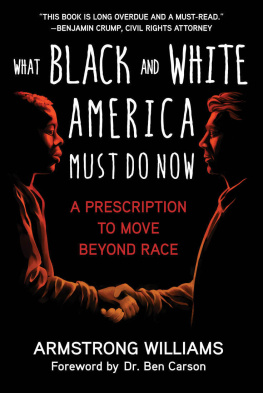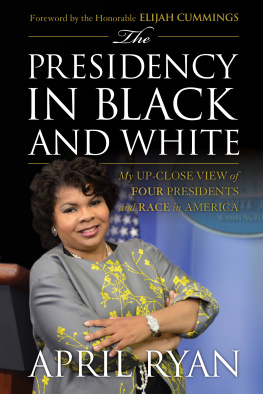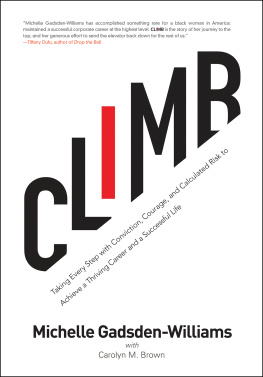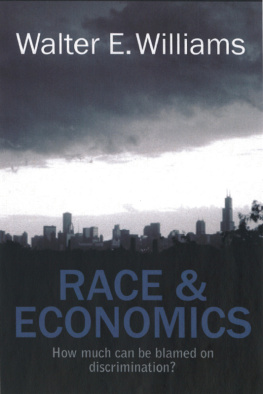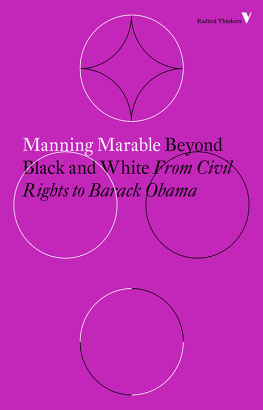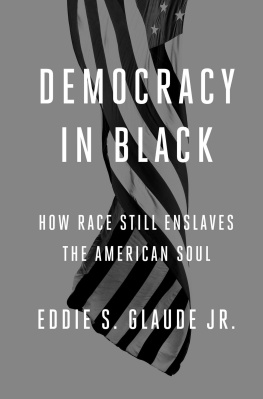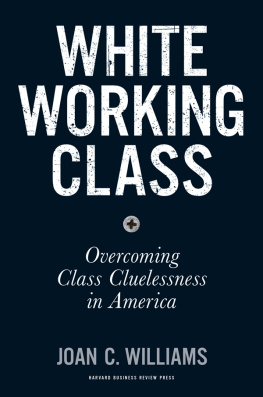Armstrong Williams - What Black and White America Must Do Now: A Prescription to Move Beyond Race
Here you can read online Armstrong Williams - What Black and White America Must Do Now: A Prescription to Move Beyond Race full text of the book (entire story) in english for free. Download pdf and epub, get meaning, cover and reviews about this ebook. year: 2020, publisher: Hot Books, genre: Politics. Description of the work, (preface) as well as reviews are available. Best literature library LitArk.com created for fans of good reading and offers a wide selection of genres:
Romance novel
Science fiction
Adventure
Detective
Science
History
Home and family
Prose
Art
Politics
Computer
Non-fiction
Religion
Business
Children
Humor
Choose a favorite category and find really read worthwhile books. Enjoy immersion in the world of imagination, feel the emotions of the characters or learn something new for yourself, make an fascinating discovery.
- Book:What Black and White America Must Do Now: A Prescription to Move Beyond Race
- Author:
- Publisher:Hot Books
- Genre:
- Year:2020
- Rating:4 / 5
- Favourites:Add to favourites
- Your mark:
- 80
- 1
- 2
- 3
- 4
- 5
What Black and White America Must Do Now: A Prescription to Move Beyond Race: summary, description and annotation
We offer to read an annotation, description, summary or preface (depends on what the author of the book "What Black and White America Must Do Now: A Prescription to Move Beyond Race" wrote himself). If you haven't found the necessary information about the book — write in the comments, we will try to find it.
What Black and White America Must Do Now: A Prescription to Move Beyond Race — read online for free the complete book (whole text) full work
Below is the text of the book, divided by pages. System saving the place of the last page read, allows you to conveniently read the book "What Black and White America Must Do Now: A Prescription to Move Beyond Race" online for free, without having to search again every time where you left off. Put a bookmark, and you can go to the page where you finished reading at any time.
Font size:
Interval:
Bookmark:

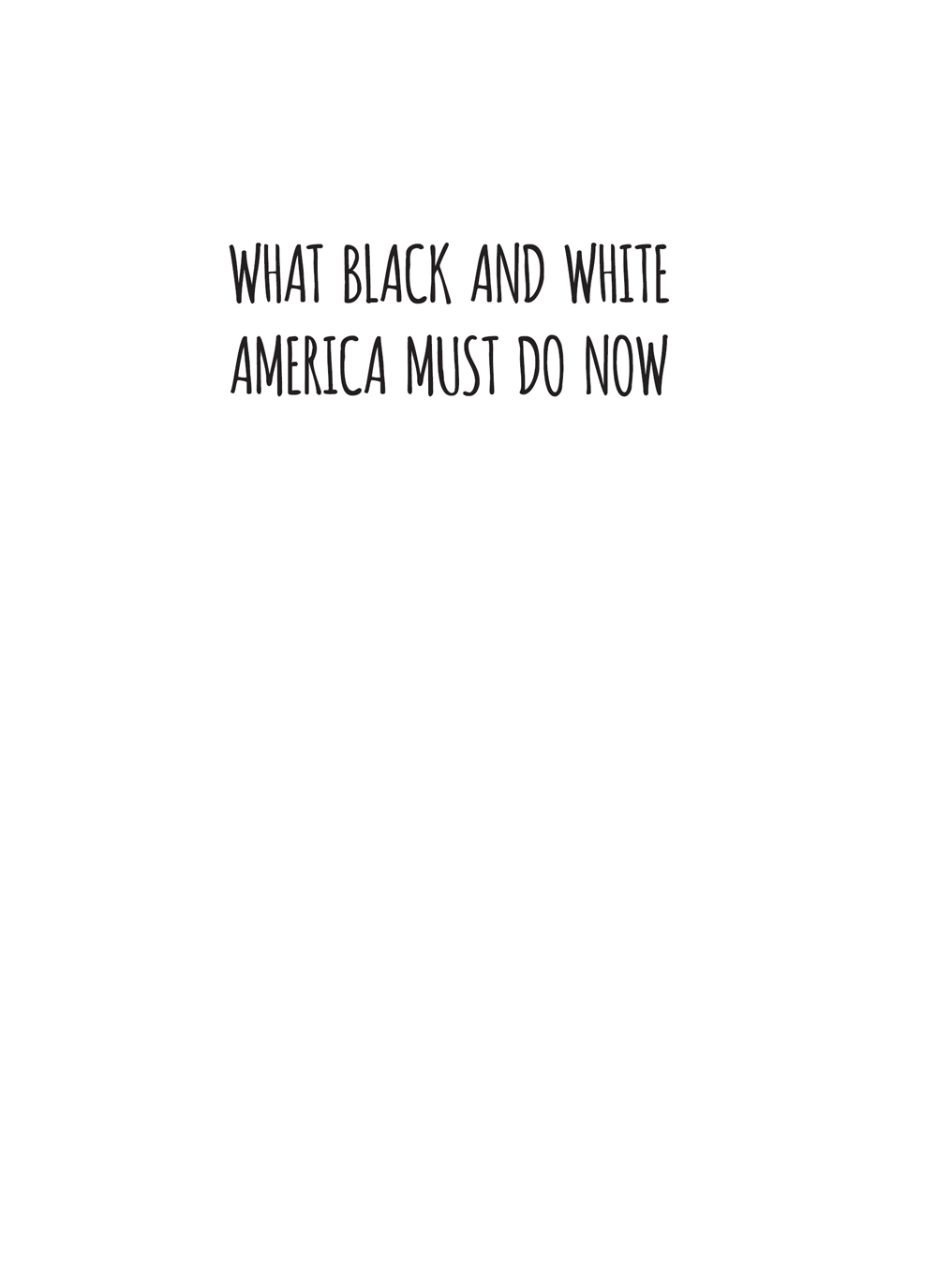

Copyright 2020 by Armstrong Williams
Foreword copyright 2020 by Dr. Ben Carson
All rights reserved. No part of this book may be reproduced in any manner without the express written consent of the publisher, except in the case of brief excerpts in critical reviews or articles. All inquiries should be addressed to Skyhorse Publishing, 307 West 36th Street, 11th Floor, New York, NY 10018.
Hot Books may be purchased in bulk at special discounts for sales promotion, corporate gifts, fund-raising, or educational purposes. Special editions can also be created to specifications. For details, contact the Special Sales Department, Skyhorse Publishing, 307 West 36th Street, 11th Floor, New York, NY 10018 or .
Hot Books is a registered trademark of Skyhorse Publishing, Inc., a Delaware corporation.
Visit our website at www.skyhorsepublishing.com.
10 9 8 7 6 5 4 3 2 1
Library of Congress Cataloging-in-Publication Data is available on file.
Print ISBN: 978-1-5107-6422-4
Ebook ISBN: 978-1-5107-6423-1
Cover design by Kai Texel
Printed in the United States of America
CONTENTS
Foreword
T he blatant and apparently senseless murder of George Floyd in Minnesota by an arresting police officer awakened our nations sensitivities regarding race issues. In the aftermath of the George Floyd case and other well-publicized incidents of violent acts committedseemingly unjustifiablyby law enforcement against African Americas, many Americans have engaged in heated debates about whether race relationships are getting better or worse; the answer of course depends on ones perspective and the environment in which one lives. In the Floyd case, which was captured on video, reactions ranged from anger to guilt to helplessness to many other things leading to an attitude that something must be done to end such blatant abuses of human rights by law enforcement. But what does that look like? On the other hand, divisive elements have eagerly sought to capture the energy associated with righteous protests surrounding the quest for human rights, and to further their own nefarious purposes. These forces tend to emerge anytime there is a national social crisis, because they want to further their own causes and really care very little about whatever the initial impetus for constructive change happened to be.
In his book, What Black and White America Must Do Now, Armstrong Williams, who is black, but has a wide range of multicultural life experiences and decades-long experience leading crisis management in government and industry, endeavors to impart wisdom and direction to a white audience who may not be equipped with the social and emotional tools to manage race relationships in times of social upheaval. This is not to say that everyones life experiences are not equally valuable, but simply to provide another perspective for those who so desire.
It is not the color of ones skin that determines how they think and perceive the world; rather it is the environment in which they have lived and are currently experiencing. This became vividly apparent to me as a freshman at Yale. It was the first year that Yale accepted women, and it was also the first year that they had more than a handful of black students. Some of the black students, unlike many of the rest of us, had grown up in privileged environments and clearly had never interacted with other black people. Some of them would barely even acknowledge our existence, while others made every effort to immerse themselves in the black experience. The point being that it was their environment that shaped their personalities and not their race. This is the first thing that both white and black Americans need to understand.
Next, people must come to understand that lack of knowledge or awareness about other peoples cultural issues does not automatically make someone a racist. We are all ignorant of one another to various degrees. And it is only by engaging in constructive dialogue, rather than assuming something about a person, that we all get to benefit from each others diverse personal experiences and grow together as a nation. Unfortunately, society is becoming less understanding of this point and is quick to level charges of racism at even the slightest provocation. This in turn makes people act out of guilt or fear in ways that they would not normally act. These artificial actions further complicate interactions with members of other races. This book explores these kinds of issues in detail and lays out a framework that whites can use to approach situations involving racial tension more constructively and effectively.
The greatest thing that the reader will realize after reading this book is that we all have spheres of influence and we can begin the amelioration process when it comes to race relations by working within our own spheres of influence. We can be the change we want to see happen in the world. We can help people understand that we serve a loving God who gave us variety. Can you imagine how boring the world would be if everybody looked exactly like you, even if youre very beautiful or youre very handsome? Hopefully, we will all come to learn that we are all in the same boat and if part of the boat sinks, eventually the rest of it will go down as well. To keep the boat afloat and sailing to a positive destination let us all work on the thing that makes us civil human beings, and that is building good and constructive relationships.
Benjamin S. Carson Sr., MD
Emeritus Professor of Neurosurgery, Oncology,
Plastic Surgery, and Pediatrics,
The Johns Hopkins Medical Institutions
Prologue
I n the Marion, South Carolina, of my youth, all were aware of the deep legacy of racial divide that is embedded in the history, culture, and tradition of the region. The dim memory of slavery and reconstruction, the more vivid recollection of the civil rights movement, and the arduous walk away from a segregated society that followed are all deeply embedded in my memory and the collective consciousness of the South. Yet even in that midst, my own upbringing as an African American child was happy, secure, and the foundation of all that has since followed in my life. Those halcyon days of youth with my father, mother, and nine brothers and sisters in the rural South are the continuous blessing that have fueled the arc of my life now into the public square of political thought, commerce, and media. From that perspective, the convulsions that now grip the nation are particularly poignant and demanding of urgent remedy. The great British poet Alfred, Lord Tennyson pointed out that poetry is emotion recollected in tranquility. Likewise, I have stepped momentarily out of the fray and back to the family farm in Marion to view the current racial landscape in America, and in the book that follows will offer particular strategies for racial reconciliation and the full-throated expansion of freedom to all our people.
We all know the problems. We have all been recently and vividly reminded of the arrival of African men, women, and children to North America in chattels and against their will. The decades of forced servitude in slavery have been newly recalled. The disenfranchisement over decades, particularly in my native Southern region, of Jim Crow, poll tests suppressing voting, raw segregation, physical violence, and reigns of terror are freshly topical. Images of torrents of water issuing from fire hoses to knock down protestors, snarling dogs to hold them at bay and behind bars, and othe images of the civil rights era are now everywhere to be seen. Currently accounts of unvarnished police brutality selectively brought to bear on African American men caught by the unblinking eye of social media have enraged a nation. Here, as this summer begins, we find ourselves rocked to the core and once again staring in the face of our divided past and without a strategy for a path forward.
Next pageFont size:
Interval:
Bookmark:
Similar books «What Black and White America Must Do Now: A Prescription to Move Beyond Race»
Look at similar books to What Black and White America Must Do Now: A Prescription to Move Beyond Race. We have selected literature similar in name and meaning in the hope of providing readers with more options to find new, interesting, not yet read works.
Discussion, reviews of the book What Black and White America Must Do Now: A Prescription to Move Beyond Race and just readers' own opinions. Leave your comments, write what you think about the work, its meaning or the main characters. Specify what exactly you liked and what you didn't like, and why you think so.

